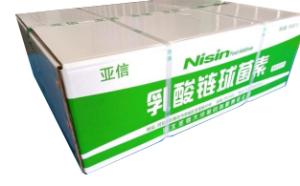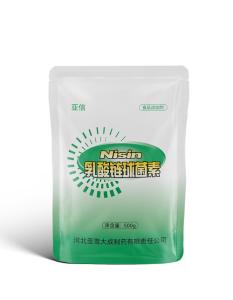

|
- Createtime: 2023-02-24
- Updatetime: 2024-11-27
The storage precautions for nisin mainly include the following aspects:
1. Storage Environment
·Cool and Ventilated: Nisin should be stored in a cool and ventilated area, avoiding direct sunlight and high temperatures, as high heat may reduce its activity or lead to inactivation.
·Dry and Clean: The storage environment should be kept dry and clean to prevent moisture and contamination. A humid environment may cause nisin to clump, affecting its effectiveness.
2. Packaging and Sealing
·Sealed Containers: Nisin should be stored in sealed containers to prevent air and moisture from entering. Sealed containers effectively maintain its dryness and activity.
·Avoid Damage: Care should be taken to prevent damage to the packaging during storage and transportation to avoid contamination or spoilage of nisin.
3. Avoid Contact with Harmful Substances
During storage, nisin should be kept away from toxic, harmful, or corrosive substances to prevent contamination or chemical reactions that could lead to degradation.
4. Shelf Life
Nisin has a certain shelf life, typically 24 months. During storage, it is important to check the product label for the production date and expiration date to avoid using expired products.
5. Regular Inspection
Regular checks should be conducted on the condition of nisin during storage, including appearance and odor. If any abnormal changes are observed, such as discoloration, clumping, or off-odors, use should be discontinued immediately, and appropriate measures should be taken.
The storage precautions for nisin include considerations for the storage environment, packaging and sealing, avoidance of harmful substance contact, shelf life, and regular inspections. Adhering to these precautions ensures that nisin maintains its activity and quality during storage, thereby ensuring its effectiveness and safety during use.
-
2023-03-13
How is Nisin produced?
Nisin is a naturally occurring antimicrobial peptide that is produced by certain strains of bacteria, particularly Lactococcus lactis. The process of nisin production involves the ...
MORE -
2023-03-14
How is ε-Polylysine hydrochloride produced?
ε-Polylysine hydrochloride, also known as ε-PL or Poly(ε-lysine), is a natural biopolymer composed of ε-lysine monomers. ε-PL is known for its antimicrobial properties and has...
MORE
- Tel:+8618231198596
- Whatsapp:18231198596
- Chat With Skype







